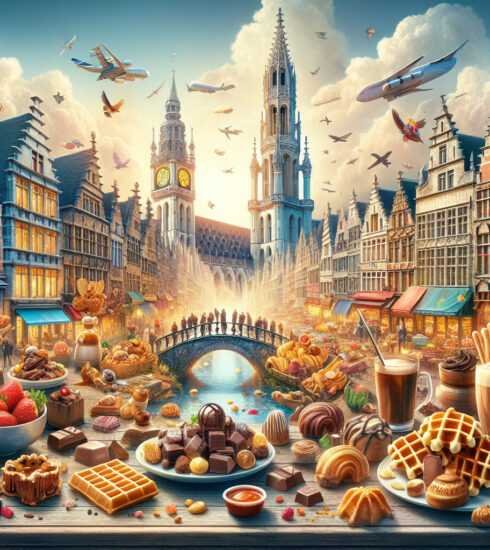Discover Belgium’s Flavorful Footprints: An Unforgettable Belgian Cuisine Tour
Belgium’s Flavorful Footprints: A Narrative Voyage Through Hidden Culinary Pathways
Belgium, with its quaint cobbled streets and medieval architecture, is often celebrated for its rich culture and history. However, what remains relatively undiscovered is its deeply rooted culinary heritage, which serves as a crucial pillar in its cultural foundation. Let us embark on a narrative journey through Belgium’s hidden culinary pathways, revealing the indelible flavor footprints left by centuries of tradition and innovation.
The Historical Tapestry of Belgian Cuisine
Belgian cuisine is a rich mosaic shaped by historical influences from neighboring countries such as France, Germany, and the Netherlands. The Belgian culinary tradition harmoniously blends these influences, resulting in a gastronomic experience that’s unique yet familiar.
One of the earliest snapshots of this culinary story can be found in the middle ages, where Belgium’s feudal landscapes were dotted with monasteries. The monks engaged in brewing beer and making cheese—crafts that have since been perfected and are cornerstone elements in Belgian cuisine today.
The Regions and Their Signature Dishes
Belgium is comprised of distinct regions, each with its unique culinary specialties. Here’s a closer look at some of these regions and the delicacies that define them:

- Flanders: Situated in the northern part of Belgium, Flanders is renowned for dishes such as Beef Carbonnade (a hearty Flemish stew) and ‘Waterzooi,’ a creamy chicken or fish stew.
- Wallonia: In the southern part of Belgium, Wallonia is famous for its game dishes, wild boar with cherry sauce, and ‘Boulets Liégeois,’ meatballs simmered in a rich gravy.
- Brussels: The heart of Belgium, Brussels is known for ‘Moules-frites’ (mussels with fries) and the famed Brussels waffles, often enjoyed with a myriad of toppings.
These regional dishes reveal much about the cultural and historical fabric that binds Belgium together.
A Wonderland for Food Enthusiasts
Belgian cuisine is not just about rich stews and famous waffles. The country is a wonderland for food enthusiasts, offering an array of culinary experiences that go beyond the expected.
Belgian Beer Culture: No discussion about Belgian cuisine is complete without mentioning its beer culture. With over 1,600 original beers, many of which are brewed by Trappist monks, Belgian beer is a subject of fermentation and flavors that can fascinate even the most discerning beer aficionados.
Cheese Varieties: Belgium also holds its own when it comes to cheese, with varieties such as Limburger and the semi-soft Chimay, which are often paired with the country’s unique beers.
The Art of Chocolate Making

The name Belgium is almost synonymous with chocolate, thanks to its globally renowned chocolate-making tradition. Belgian chocolatiers have honed their craft to create some of the world’s finest chocolates. Notable names like Godiva, Leonidas, and Pierre Marcolini have achieved international acclaim.
The secret to Belgium’s superior chocolate lies in its quality ingredients and meticulous craftsmanship. If you find yourself traversing through the streets of Brussels or Bruges, don’t miss out on chocolate tasting tours that offer a sumptuous dive into this sweet tradition.
Influences and Innovations
Belgium’s culinary landscape is ever-evolving, thanks to its dynamic blend of traditional practices and modern influences. Michelin-starred restaurants and innovative chefs are popping up across the country, boldly experimenting with ingredients and presentation while staying true to Belgian roots.
Chefs like Peter Goossens and Gert De Mangeleer have put Belgium on the global culinary map, showing the world that Belgian cuisine is not just steeped in tradition but is also a playground for innovative culinary concepts.
Culinary Tours: A Guided Experience
For those seeking an immersive experience, culinary tours in Belgium offer the perfect opportunity to deeply understand and appreciate the country’s rich food culture. These tours guide you through hidden gems, from quaint local eateries to highly-acclaimed restaurants.
One particularly noteworthy culinary tour can be found in ‘Belgium’s Culinary Treasures,’ which provides a thorough exploration of Belgian gastronomy. For further details, visit Belgium’s Culinary Treasures.

Similarly, ‘Belgian Delights’ offers a curated tour that includes everything from chocolate tasting to sampling gourmet meals. Explore more at Belgian Delights.
Additional Marvels of Belgian Cuisine
Beyond the commonly celebrated aspects of Belgian food, there are numerous lesser-known, yet equally delightful facets waiting to be discovered:
- Pate and Charcuterie: Belgium produces some of the finest pates and charcuterie, thanks to its long-standing tradition of meat preservation. Visit local markets to sample these authentic delicacies.
- Bread and Pastries: The country’s bakery scene offers irresistible pastries such as ‘Couque de Dinant,’ a hard, honey-flavored cookie, and varieties of artisan bread worth indulging in.
- Street Food: From fries served in paper cones with a variety of sauces to warm and fresh ‘smoutebollen’ (Belgian donuts), the street food scene offers quick, delicious bites.
Conclusion: Savoring the Legacy
Belgium’s culinary pathways are a testament to the country’s rich history and evolving traditions. As you traverse these flavorful roads, each dish and sip you encounter tells a story—a narrative woven through centuries of cultural exchange, regional pride, and culinary innovation.
To truly appreciate Belgium’s flavorful footprints, whether you are a casual traveler or a dedicated foodie, engaging in a culinary tour could be the key to unlocking these hidden gems. Enjoy the journey, savor the legacy, and discover the treasures that make Belgian cuisine an unforgettable experience.





